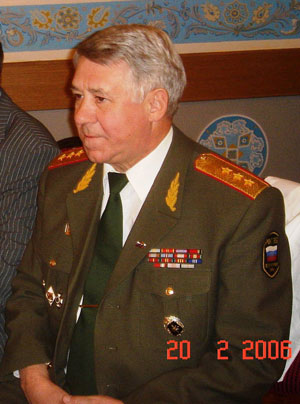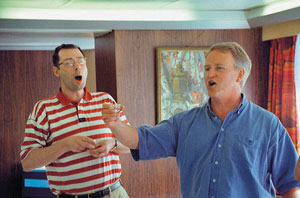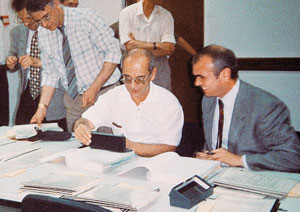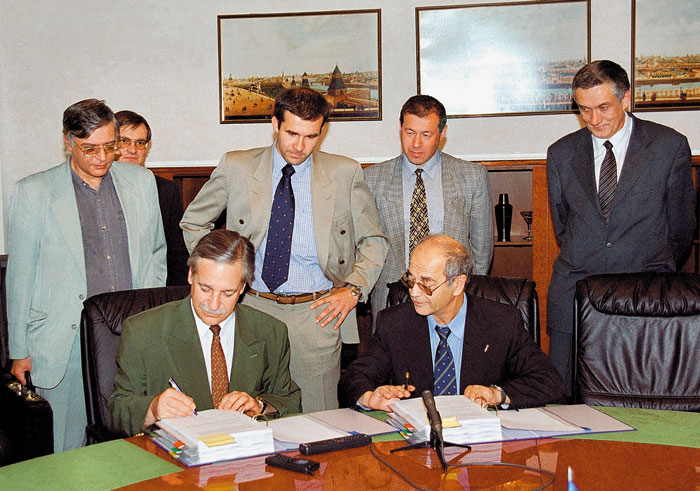By 1995, however, when VympelCom was leading the market, some of us (honestly, very, very few of us) began to realize Russia was at a strategic competitive disadvantage because it relied on the American AMPS standard (which was true even for its digital version, D-AMPS, to which we had promptly converted our entire Moscow network) instead of the new European GSM standard.
This presented a fundamental threat to the company’s very survival.
 So it was in this atmosphere that in the February of 1995 we succeeded in talking the deputy commander of Communications Troops of the Russian Federation, general-colonel Alexander Anatolyevich Ivanov, into signing a letter to the GKRCh and the Communications Ministry approving use of the 20 MHz frequency in the 1800 MHz band for civilian cellular communications.
So it was in this atmosphere that in the February of 1995 we succeeded in talking the deputy commander of Communications Troops of the Russian Federation, general-colonel Alexander Anatolyevich Ivanov, into signing a letter to the GKRCh and the Communications Ministry approving use of the 20 MHz frequency in the 1800 MHz band for civilian cellular communications.Here he is in my photo, although older by ten years, retired, having served since as Communications Minister of the RF and president of the Board of Directors of Comet, a small but successful company. This photo was taken at the banquet that Comet would throw on important-for-the-country holidays.
Deepest gratitude and many years of life to you, dear Alexander Anatolyevich.
Armed with this letter, we got Vladimir Borisovich Bulgak, a good man, to agree relatively easily to issue us the first Russian license for the Moscow region for the new standard that was just being introduced in the West: the DCS-1800, which two years later was renamed GSM-180. The license was issued to KB Impulse. Apart from us no one was vying for this new standard.
But the devil that would pop up so many times on our GSM-way wasn’t sleeping – even at this early stage. Soon we received word of a very strange ban on the issuance of our license from the Communications Ministry, in force until that point when KB Impulse is transferred under the control of Moskomimushchestvo. Two deputy ministers at once, one of whom was also a state secretary at the Ministry, were trying to explain to me, and maybe to themselves, what all this could mean. One day, however, an angel flew over Tverskaya, 7 and chased the devil away. Not for long, but the ban was lifted.
I think that the reasons for this strange episode will remain shrouded in mystery. The Ministry bureaucrats who could have explained it have since forgotten how. And they got better off forgetting it. As for the devil, he has long since turned into a respectable gentleman. There will be a different devil on Tverskaya now.
The frequency that we got from the military and the mysterious problem with the license marked the beginning of our thorny journey down the GSM highway.
When we were fighting for the DCS-1800 license, we hadn’t even thought of having access to GSM-900 and NMT-450, licenses which were already held by MTS and MSS. This was their domain, and we didn’t dare trespass. The same was true for AMPS-800 and DCS-1800 - they were our standards and our bands, and no one dared cross us. At least, that was the way the license policy of the Communications Ministry was understood at the time.
The letter from the Ministry explaining this policy, which was the basis for all our business planning, is featured in the appendix [page 4] (to justify such attention to this document I will say, getting ahead of myself, that a sudden change in this policy by the Ministry in favor of our competitor will put VympelCom in a desperate situation, which is one of the intrigues of the present chapter. Read on).
Against this background, in 1995 we made a daring, risky decision to continue slowly developing the AMPS network, which was our only source of income, while simultaneously building a second network using the DCS-1800 standard on the same territory. In the future, when we would have hundreds of thousands or even millions of subscribers and the GSM-900 network of our rival would buckle under this kind of pressure, the latter network would have been able to guarantee to VympelCom a possibility of presenting a decent competition.
But before we had to survive the predictably losing stage of competition with the rival whose technology based on GSM-900 was apriori more adequate for this initial stage of business development. And do that under the burden of costs associated with building and maintaining two competing technologies in one territory – one of which, moreover, was the most expensive to build.
The optimistic versions of our business plan nevertheless showed that there was a chance of success. We had rejected the alternative – to revel in high profitability of AMPS and stick with a single network (and we already had licenses for a few regions which, if we focused on GSM, we would have to abandon). So, let’s go. The challenge of the struggle between GSM-1800 and GSM-900 awaited us.
The adoption of this new strategy caused a serious split within the company, which was both dramatic and laughable.
Our hopes for success were fueled by a profitable and unprecedented contract with Alcatel for GSM-1800 equipment for our Moscow network. It was partially paid for with shares of KB Impulse, whose only advantage was that it had a license for GSM-1800 in the Moscow area. It was May of 1996. We were not on the stock market yet, and neither the shares of KB Impulse or those of VympelCom were liquid. In addition, my own VympelCom shares were pawned to Ericsson for shipments of AMPS network equipment, but in this case it was but one of the ways of guaranteeing the product credit.
 In this picture Ericsson representatives, overjoyed at the signing of the contract (we were still the only buyer of AMPS equipment in Europe) are singing Swedish folk songs at one of our corporate parties.
In this picture Ericsson representatives, overjoyed at the signing of the contract (we were still the only buyer of AMPS equipment in Europe) are singing Swedish folk songs at one of our corporate parties.
In the case of Alcatel, something unheard of had happened: the globally-known manufacturer became a shareholder in a carrier company (sounds like nonsense already), which, to boot, hadn’t even begun its business or proven itself in any substantial way; and as its share of the capital investment, the manufacturing company provided the equipment for the cellular network in Moscow.
This was one of the most original and most  successful deals of my business life.
successful deals of my business life.
The head of the Alcatel Mobile department, Alain Bravo demonstrated inordinate audacity by agreeing to sign this contract in 1996.
In my archive I have only one very bad picture of the moment when the contract was signed at our office on Mayakovskaya.
The deal was advantageous for us also in that for the first time it put a value on one of our companies. This later had a favorable affect on the market price of VympelCom.
A few years later we bought our shares back from Alacatel, which it had been counting on all along, but had not assumed from the beginning.
The bravery of Alactel could be explained at the time by its having problems in the GSM market following the loss of a large contract somewhere in Southeast Asia, and it was important for them to put a stake in the emerging Russian market.
Their audacity paid off.
This contract kicked off a dynamic stage of network build-up within our company. This photo from the early summer of 1996 shows some of its active participants: the charming Frenchman, Alcatel’s representative in Russia, Monsieur Lacroix (signing the contract); a current member of the VymeplCom’s management Sergei Avdeev, who was the leading character in the GSM project (he story of his entering the company is still awaiting a playwright); and pleasing to me, Avdeev’s colleagues Simkin and Musayev; behind them, peeking out, is the German Franz Muller, who had shown us the Alcatel production plant in Germany.




